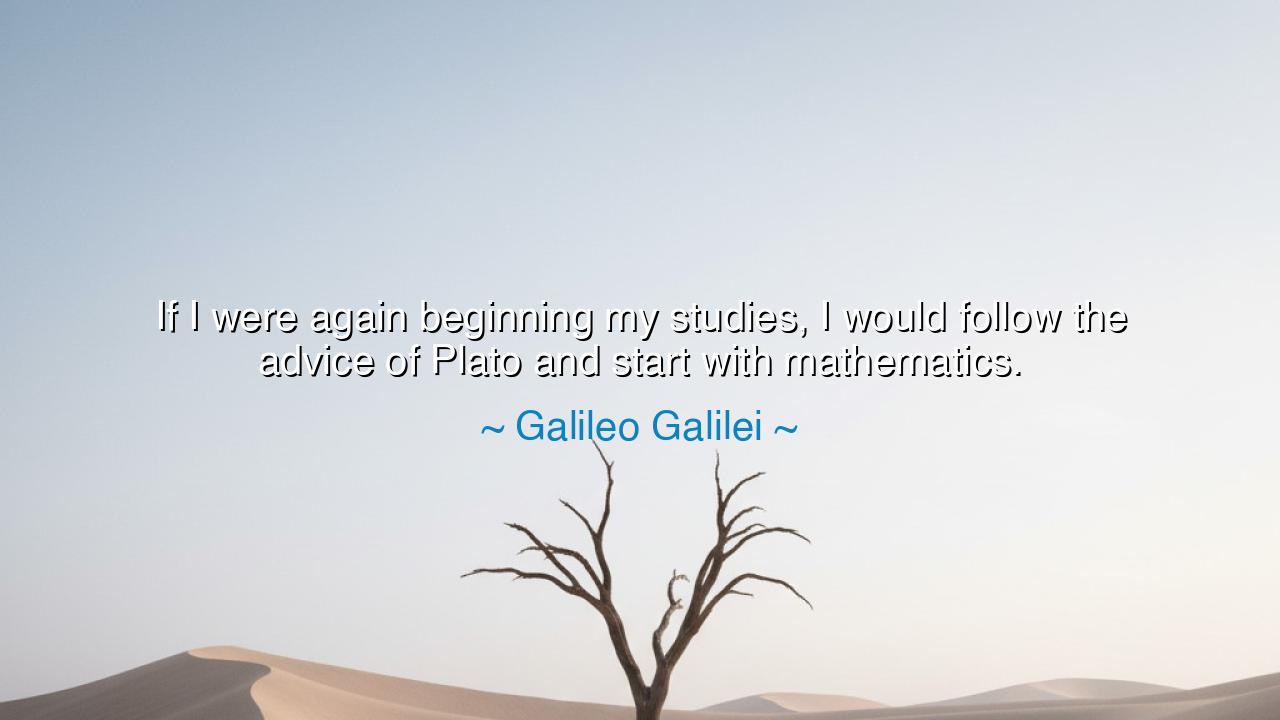
If I were again beginning my studies, I would follow the advice
If I were again beginning my studies, I would follow the advice of Plato and start with mathematics.






There are words that echo across the centuries like the toll of a great bell, calling the minds of men toward truth and clarity. Among such immortal utterances are those of Galileo Galilei, the father of modern science, who once said: “If I were again beginning my studies, I would follow the advice of Plato and start with mathematics.” In this confession lies not regret, but revelation—the realization that mathematics is not merely a tool of calculation, but the divine language in which the universe itself is written. Galileo, who gazed through his telescope and unveiled the secrets of the heavens, understood that beneath the chaos of appearances lies a sublime order—a harmony that only mathematics can unveil.
To understand Galileo’s wisdom, we must first remember his life and struggle. Born in 1564 in Pisa, he stood at the dawn of a new age when faith and reason wrestled for dominion over the human soul. His discoveries—of the moons of Jupiter, the motion of the pendulum, and the laws of falling bodies—shattered old illusions and built the foundations of science. Yet behind every experiment and every equation was the same conviction: that the universe is governed not by whim, but by order, and that this order can be grasped only through mathematics. Thus, when Galileo speaks of beginning again, he does not yearn for youth, but for wisdom—to build his understanding upon the solid ground where number, proportion, and geometry reveal the eternal structure of creation.
Galileo’s reverence for Plato is no accident. Centuries before him, the philosopher had inscribed above the entrance to his Academy: “Let no one ignorant of geometry enter here.” For Plato believed that mathematics was the first ladder by which the mind ascends from the shadows of illusion to the light of truth. Numbers, he taught, reflect the eternal forms that govern all things, bridging the finite and the infinite. Galileo, standing at the edge of the scientific revolution, saw this ancient wisdom renewed in the heavens themselves. For when he measured the stars, he found what Plato had only imagined—that the universe moves with perfect mathematical grace, as if composed by the hand of a divine geometer.
Indeed, to “start with mathematics” is to begin one’s search for truth with clarity, discipline, and wonder. For mathematics purifies the mind; it teaches precision of thought, patience in reasoning, and reverence for truth untainted by opinion. It is the training of both logic and humility—for in its pure order, one sees how small human error is beside cosmic law. Galileo knew that all knowledge built without this foundation is like a house upon sand: it may dazzle for a moment, but it cannot endure. But knowledge grounded in mathematics stands eternal, for it aligns the human mind with the order of the universe itself.
History bears witness to the power of this truth. Consider Isaac Newton, who followed in Galileo’s steps. Through mathematics, he bound the heavens and the earth in one great law—the law of universal gravitation. Where men once saw the hand of gods tossing planets across the sky, Newton, guided by Galileo’s light, saw the calm, precise rhythm of numbers and forces. Later came Einstein, who bent the laws of space and time themselves into equations of elegant simplicity. And so, from Plato to Galileo, from Galileo to Newton, and from Newton to Einstein, the chain of mathematical visionaries stretched unbroken—each revealing a deeper layer of the divine architecture of existence.
Yet, Galileo’s words speak not only to scholars, but to all who seek wisdom in any field. To “begin with mathematics” means to begin with structure, reason, and the love of truth. Whether one studies art, philosophy, or politics, there is mathematics in the harmony of a painting, in the rhythm of speech, in the balance of justice. The mind trained in mathematics learns to discern proportion and pattern in all things—to think not by impulse, but by principle. Thus, Galileo’s message is not confined to astronomers or physicists; it is a call to all who would think clearly, live wisely, and perceive the hidden unity of the world.
The lesson of Galileo’s reflection is eternal: wisdom is built upon order, and order begins with understanding. To live without structure is to drift through life like a ship without a compass. But to live guided by the logic of truth—whether in numbers, actions, or ideals—is to move with purpose toward light. The practical teaching is this: train the mind before you seek mastery; cultivate reason before ambition; learn to see patterns before you chase results. In the smallest equation, as in the vastest galaxy, the same beauty dwells—the beauty of law, proportion, and meaning.
And so, let Galileo’s words ring out to all generations: “If I were again beginning my studies, I would follow the advice of Plato and start with mathematics.” For mathematics is not cold, as some believe—it is the music of reason, the geometry of truth, the language of the divine. It shapes the mind to see the world not as chaos, but as cosmos; not as confusion, but as harmony. To study it is to stand nearer to the mind of creation itself. And when one learns, as Galileo did, to read the universe in the language of number, he does not merely understand the world—he learns to dwell in awe of its perfection.






AAdministratorAdministrator
Welcome, honored guests. Please leave a comment, we will respond soon